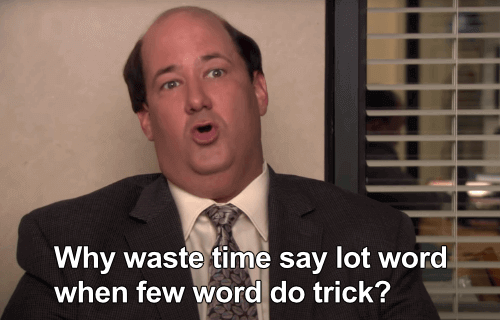Question above is pretty blunt but was doing a study for a college course and came across that stat. How is that possible? My high school sucked but I was well equipped even with that sub standard level of education for college. Obviously income is a thing but to think 1 out of 5 American adults is categorized as illiterate is…astounding. Now poor media literacy I get, but not this. Edit: this was from a department of education report from 2022. Just incase people are curious where that comes from. It does also specify as literate in English so maybe not as grim as I thought.
If you don’t understand, start walking further away from the cities.
If you still don’t understand, you’re not done walking.
There’s a slight gradient in literacy when looking at grade level but it’s not really accurate with illiteracy. Seems cities can still have a considerable population that can’t read.
Home schoolers/child abusers are everywhere.
Note: Not talking about legitimate, regular curriculum, “online school” for kids that can’t attend normal school for whatever reason, (e.g. bullying, immunocompromised, etc). I’m referring to religious/cult garbage home schooling stuff that doesn’t teach kids much of anything. Parents that put girls through these programs often end them at the fifth or sixth grade (because that’s all they need to be “good wives”).
Walk far enough into certain cities and you’ll see the same problem. It’s very closely tied to socio-economic class and a self perpetuating problem.
If you think the problem is in the countryside, you’ve never been to New York City, and particularly the Bronx.
Right?
I grew up in New York city, and lived in the Bronx. Most of the people living there are literate in their mother tongue, less so in English. Is that what you were trying to say?
No. What I meant to say is that native English speakers in the Bronx have poor literacy rates.
https://www.norwoodnews.org/bronx-barriers-literacy-challenge/
To add to this, I think people often underestimate how “easy” it can be to function in society without being able to read well. I know that some folks who either don’t read at all or read at a very low level have just gotten used to interpreting the world around them without the language part. For example, visually recognizing a username and password field on a website and knowing what they’re for, or recognizing the symbols and colors used for certain objects or meanings, all without the actual words needing to mean anything to them for them to understand what it is and what to do with it. And for those who can read at a 5th or 4th grade level (and would thus be included in the stat mentioned in this post), they’re likely then very capable of reading and understanding the majority of text they’re going to come across in their day-to-day lives.
Of course, I don’t want this to sound like I’m saying being illiterate is easy, I’m sure it creates MANY barriers and difficulties for the person, but I do think humans are also flexible and resilient, and are able to survive using other cues.
It sounds so much harder than just reading.
But I believe it. I work in law and often need clients to respond in writing to questions (so we have a record of their answers). The barely-coherent poorly-spelled responses we get are astonishing - and often from pretty well educated, smart people with high level jobs (after all, they can afford a lawyer).
You have it backwards actually. You need to walk further into the cities to see the really poorly-educated.
Here’s the actual data. Look at Illinois for example. All the rural counties are right around 8% functional illiteracy. Then Cook County (Chicago) is literally double at 19%. The trend seems to repeat in every state. Queens and Brooklyn are the most illiterate parts of NY, while far-away Ontario County is the most literate.
The only real exception is in the Southwest. California’s most illiterate county is rural Imperial County with a whopping 41% illiteracy because of all the immigration.
Most rural people hate me and want me to be murdered after I’m publicly humiliated.
I live in a rural area and I am just really tired of having to hate all of my coworkers. They’ll all try to rant at you unless they know you’re lgbt, in which case they’ll never talk to you and report you for everything.
So I am a researcher by trade in this field, got a PhD, and develop these kinds of stats (at a more local level). I also have taught basic adult literacy for about 15 years. I think the poster was likely referring to an NCES stat.
We tend to think of adults with low English literacy as people who dropped out of school or never went. We also tend to think “illiterate” is binary, you can read or you can’t. But the definition is based around grade-level reading (what can you identify and synthesize from standardized text in English in a given time frame) and inclusive of a broader population. We’re talking about people who can’t pick up a copy of USA today and tell you the main idea of a front-page article. They can drive, they can work, etc. So they get along and this issue get ignored.
For example, some stats on illiteracy will count “non-participants” among those who can’t read/write, but this includes people in the study with cognitive disabilities or language barriers to the point that they can’t take the reading test. The share of U.S. adults who are functionally illiterate in English includes some non-native English speaking adults and also a couple generations of folks with reading diasbilities who passed through school, AND people who didn’t read for myriad other reasons.
I have tutored older adults learning to read/write for many years and have met a lot of people who ran businesses or raised families or worked full careers before learning to read. Adaptable and clever bunch. And even many U.S.-born native English speakers who got shuffled through high school despite serious disadvantage and/or disabilities.
people who can’t pick up a copy of USA today and tell you the main idea of a front-page article
Thanks! Suddenly America makes a lot of sense now.
the definition is based around grade-level reading (what can you identify and synthesize from standardized text in English in a given time frame) and inclusive of a broader population. We’re talking about people who can’t pick up a copy of USA today and tell you the main idea of a front-page article.
Purely anecdotal, but I know someone who is a tenured professor at a university that will flat out refuse to answer any question that has too much supporting detail around it. As in, if you say “for this part of the assignment, I’m doing…” and proceed to describe your attempt at problem solving over four or five sentences, asking if what you’ve done is correct or close to it, and he will simply respond with “there’s too much here to unpack, sorry,” and refuse to answer the question. But if you do it in person, like verbally read out the same paragraph you wrote, he can understand and answer it. There’s other things, too. He can type out simple sentences, but has a very poor grasp of spelling, frequently getting very simple words wrong (think different versions of there, their, and they’re). It’s genuinely baffling how he got to that point, but he also hasn’t ever really published material and it kinda makes sense why. Dude has a doctorate in a STEM field and I think the reason for that is that he can understand mathematics, but literally can’t understand complex writing. Any idea that takes more than a single sentence to explicate just evaporates out of his head.
I’ve never seen anything as extreme as you describe, but when I took the GRE I met a guy kind of like this. After you finish the exam it gives you an estimate of your score, but your real scores are sent to you weeks later. On the way out some guy asked me how I did (fairly well but not 97% plus on anything). He was like “oh damn if you don’t get above 95% on math then you can’t go to grad school in STEM lol”. I asked him what he got in the reading and writing and he said <33% “but that isn’t important for grad school” lmao
I do have to wonder how he ever got through his doctorate. Reading is like the second most important skill for physicists, and writing isn’t too far down the list either. Maybe it’s different for mathematicians and/or other stem fields, but unless he’s a super-genius, he’d be confronted to the need to read articles/material at some point, no?
Sounds like dyslexia
Very interesting read! I’m from Germany and taught myself English. I’m currently at a C1/B2 level (it’s a European standard I think?) and consider myself good enough to move through English speaking countries independently just fine.
I’m basically studying English every day by reading and watching YouTube exclusively in English. Love it!
It’s a shame that many people don’t bother honing their language skills.
Didn’t you have English classes at school? I have also significantly improved my English through English media such as reddit, youtube, movies, books etc. But I don’t know if I would have been able to do that without learning basic English at school.
deleted by creator
That’s really impressive, I do wish I took learning another language more seriously when I was younger. Everyonce Ina while I try to dig back into it but lose motivation for one reason or another.
What did you find to be the most helpful starting out?
With English, finding the motivation is easy, since pretty much all media, be it movies or games, is in English. I learned the basics in school, but most of my vocabulary is from games.
I have been thinking of learning fourth language, but it’s hard to find a good enough reason for it. Maybe I should just change games to appropriate language? At least it would improve replayability, since 90% of the plot would be missed.
deleted by creator
Thanks for the pointers! For context, English is my only language, but the premise applied to other languages is the same, so thanks!
I have tutored older adults learning to read/write for many years and have met a lot of people who ran businesses or raised families or worked full careers before learning to read. Adaptable and clever bunch.
I feel like I’d like to hear stories about this. But I’m unsure what to ask for specifically.
Because the government, federal and state level (especially conservative) hate public education and fight to defund it as much as possible. Largely because an educated populace is a dangerous populace. Especially when your political platform relies on identity politics, culture wars, cheating, screwing over the poor, opposing minorities, religious fundamentalism, and any other regressive, oppressive bullshit you can think of. They want stupid voters that they can point at “the enemy” and pit against each other to distract them from facts, all so they can stay rich and powerful.
It’s because a lot of conservatives believe in a really screwed up, masochistic, bastardized version of Christianity that prioritizes vengeance, punishment, and anger. It ignores the love, kindness, acceptance, and mercy (ie the actual teachings of Jesus) that make society work well.
So, when kids come home with these new ideas about kindness and acceptance, because being kind to a gay classmate is a great way to demonstrate the love real Christianity teaches and society values, the parents freak out. They push to ban books, fire teachers, and move their kids to private schools that more match their hate filled, divisive worldview. Education polluted their child with abnormal, liberal indoctrination, like being kind, empathetic, and accepting of others.
I an attempt to steer their children back to their core values of hate and divisiveness, they lash out. Any pushback the parents feel in response becomes persecution, because of course “the world” would disagree with them. They’re the TRUE Christians afterall. So they isolate in ecochambers, and they get more hateful. Any difference of opinion is met with derision and just simply validates their position. And despite being the TRUE Christians, or REAL conservatives, they become less Christian and less conservative every day, instead just becoming these weird, evil, empty husks of people with no real values or ideals outside of hate.
undefined> schools clearly.
4 2
No single answer is comprehensive enough to explain the low literacy levels in the US. That’s because some of the contributing factors include:
- Parents with little schooling.
- Lack of books and reading encouragement at home.
- Dropping out of school.
- Difficult living conditions – including poverty.
- Learning disabilities.
Each of these topics has social and political implications and we, as a society, have made choices that privilege the rich and the least vulnerable. Our immediacy leads us to focus on inflation rates, employment, and reelection (don’t get me wrong, these are essential points). But we should also seek solutions to bring parents back to school, campaign for more books at home, and improve schooling to prevent dropout.
The discussion of U.S. illiteracy gets gloomier when we consider the differences between “literacy” (reading, writing, and math skills) and “functional literacy” (the practical use of these skills to manage daily life and improve socioeconomic well-being).
There’s a long and rocky road to reverse this picture, and some of the possible solutions to promote higher levels of literacy in society should take into account:
- low income resources
- stigma and shame
- lack of awareness
- limited access to education
- technological barriers
- limited funding for literacy programs.
So, how is it possible that roughly 50% of Americans can’t read above a 6th grade level and how are 21% just flat out illiterate?
All of the above, and probably more!
Your response is definitely the best one here. There’s just so many factors at play, and Covid was the perfect storm that amplified all of them.
COVID-19 turned into a perfect storm as most schools were unprepared for remote learning. Add to that the fact that many students had no access to a reliably fast internet connection and the whole literacy picture gets rather bleak. Thanks for sharing your views on my perspective.
Part of the reason so many can’t read above a 6th grade level is that they are always written to on that level. Anything written for any commercial purpose is always written at a low level so any idiot can understand the menu / read the packaging / consume the magazine ad / whatever. Commercial writers write for the lowest common denominator and to an extent, news media do as well.
So a 6th grade reading level is really all you need to get by. Unless you actually read books or opt for The Economist or something else that doesn’t assume you’re a moron, 6th grade level is all you’re gonna see.
There’s some utility in this. Simpler language is also lowest-common denominator for second-language-speakers, of which we have many. Another reason to use it.
It’s also important to note that a low reading grade level for writing is not “bad writing.” Most novels fall somewhere between 5th and 7th grade reading levels. Stephen King is typically around 6th grade, and Jane Austin was often at about 5th grade, for examples. There are plenty of writers who convey complex stories and themes at even lower grade levels, and it’s not unheard of to read a complex story at even a 4th or 3rd grade level. In many contexts a low grade level does not mean the content is simple or dumbed down–it’s just a measurement of the conveyance or style of the writing.
I tried to read Gravity’s Rainbow a few times. Is Pynchon some kind of genius or is he just an asshole?
Also looking at you James Joyce.
I found the first part of Gravity’s Rainbow a very fun ride. But I took a break at that point as it is very slow to read and I wouldn’t want to interrupt it mid-part. I was impressed that it was able to explain mathematical concepts in simple yet correct ways, which is rare in books let alone books this crazy.
Finnegans Wake on the other hand I haven’t even given a serious try. Spelling words as you see fit is too much for me.
Thank you for writing that in 6th grade English
I’m not an expert, but I have to imagine it’s in relation to the fact that public education in the United States tends to be rather underfunded. Teachers often don’t have all the resources to do their jobs effectively, and many resort to paying for resources out of their own pocket.
Pair that with the fact that the average salary for a teacher in a public school is almost criminally low for a position that has a massive impact on our social outcomes, and you get students that are disengaged and overall not as prepared as they could be.
This is all just what I’ve gathered from reading news articles over time. I’m sure there are several other factors at play.
It has far more to do with parents than teachers for basic literacy. If a family/child doesn’t read at home, the child will never get enough practice to achieve a high level of comprehension.
My grade 5 child already reads at a grade 9 of 10 level, but we read together every night and have done so for the last decade of his life. His room has more books than toys.
His average schoolmate has an Xbox in their room instead of books. He complains about it all the time. The electronic device in his room is his kindle.
Cuba didn’t achieve 98% literacy by having a country of concerned parents. They had a massive education push with basically unlimited support from the government.
Placing the responsibility of America’s failure to educate its populace on individuals is honestly kind of insidious. America needs to dedicate resources to education. Period. Their failure to do so is why so many Americans are dumber than stumps.
They didn’t achieve that rate through childhood education investmemt. They spent a few years forcing (as in it wasn’t optional) adults to become literate too. At the peak about one in ten cubans were involved in teaching others, they even closed schools early at one point and literally drafted 100k students to go teach adults.
The parents weren’t needed because an even higher power stepped in to mandate things and actually could and did enforce it.
The US government doesn’t have the political authority to mandate such a thing, the rights of individuals are very strong in the US, including the right to be ignorant. Parental involvement is the only realistic option to improve the current situation.
To add on to that, without publicly funded education those illiterates will only perpetuate and exacerbate the problem. If one generation is poorly educated their children will have even more difficulties. And their children even worse. And then they are stuck forever because without education it is uncommon to have enough money to afford a good one for their kids.
If education is privatized and costs money no poor and uneducated person can ever climb out of their misery on their own.
That’s great that you’ve fostered a love for reading, I believe that’s an incredibly important thing for a young mind.
But i also don’t think not allowing video games at all isn’t necessary. I grew up reading and playing online games, it’s possible to ensure a balance. And today online games are a huge part of the socializing that happens. It sucks to sit at the lunch table and have your friends talk about conversations they had that you couldn’t be a part of.
I played video games with all my boys for hours yesterday, they just don’t have unrestricted access to them, or private access in their rooms.
I agree online socializing is important, but I also have to make sure they aren’t watching Andrew Tate videos (yes, this is unfortunately a thing for some of the 11 year old boys on his sports team)
Help them build a good foundation and they’ll end up building a good house for themselves.
His average schoolmate has an Xbox in their room instead of books. He complains about it all the time.
I’m skeptical.
Only almost criminally low?
As a school psychologist who completes academic assessments when identifying students with learning disabilities, COVID skyrocketed these numbers. There’s just not a lot of motivation for kids anymore. The future is here and is making our population slowly illiterate.
That ‘motivation’ bit is so important. Former educator, currently still working in education, and I’m always wary of anything that makes a sweeping statement about ‘the kids’ not being ‘all right’. But there are important, substantial contributors to undesirable outcomes that need to be acknowledged. Poverty being one, as well as the cycle of poverty and abuse which is deeply tied to white flight and de-industrialization (which we might collectively assign to the death of the American dream if we aren’t too concerned with being precious about the the notion of patriotism).
Saying ‘iPads’ or ‘TikTok’ is the culprit doesn’t help anyone. But iPads and TikTok are contributing factors because they both exacerbate the feeling that being entertained is enough to scrape one’s way through life at the bottom of the barrel of expectations…as well as over-informing young people (and adults) that there is positively nothing left to look forward to. Industry is collapsing, housing and transportation are unaffordable, everything you once expected to purchase (and let’s not get lost talking about purchasing as a metric for determining whether one is living a good life) has now moved to an ever-bleeding subscription model; inflation is compounded by corporate greed (and maybe we should talk about how the business incentive of endless growth contributes to every other problem) and corporate greed (something no one but the executives and their shareholders can influence, let alone control) is raping all the natural splendor, wealth and even health and stability of the very ground we walk on and air we breathe.
Why the fuck wouldn’t some young person whose future job prospects (which were shit to begin with) are being devoured by AI, just turn toward the boundless font of readily accessible entertainment rather than going uphill toward seemingly fruitless self improvement? Why would they bother to rise to the level of literacy that allows them to appreciate a 19th century classic translated from the original Russian, or to parse the dense theming of some modern masterpiece? What’s the reward, to someone whose entire life to this point has been flavored with instant gratification? To them it’s all just ‘content’, and there’s plenty of content more accessible than literature. Art may mean nothing for many reasons, not least of which is it can be falsified to a level of acceptability (AI songs by dead artists, for example).
It’s a Twilight Zone, Black Mirror, Brave New World living nightmare. But what is the alternative? What systems or entities or organizations are coming to save the day? There are none. This moment is a gruesome forbidden experiment: it is a post-Reaganite, neoliberal race to the cultural bottom, and the youngest generation are the lab rats.

The weird part is because a lot of people don’t know what illiterate means…
They think these people can’t read a fast food menu and words just look like chicken scratch.
The definition of illiterate is “unable to read or write.”
That pretty much sounds like what you just said. What do you think it means?
There isn’t much nuance in the definition.
Illiteracy in developed countries usually refers to functional illiteracy, not a complete unfamiliarity with letters and words.
Functional illiteracy means your ability to read and write is insufficient for you to function effectively in society. Functionally illiterate people may be able to read to some limited extent, but might read too poorly or slowly to process the types of written information they encounter on a day-to-day basis. These people would not be able to understand forms at the doctor’s office, the instructions on their taxes, the terms of credit card agreements, the contents of important mail, and other material that might be important for them to understand.
Yeah, I was going to ask if that’s the number for functional illeteracy. I know it’s shockingly high in the US but it’s not the same as being illetirate.
There are levels of illiteracy. Most everyone has some literacy but the classifications are not very detailed, so completely illiterate may include being able to read a menu and choosing simple items.
Following an instructions manual for assembling/mounting something is much harder. Because of how frowned upon illiteracy is people who are illiterate get good at hiding their illiteracy.
An uneducated population can’t educate itself.
Republicans.
They want everyone uneducated because the more educated you are, the more likely you are to vote democrat. Hence all the defunding of school programs
They want you uneducated so you’re not able to comprehend the nigh infinite ways they’re constantly chipping away personal freedoms and enriching themselves and their corporate benefactors. So they can dismantle public institutions and replace them with private for-profit businesses.
They also love ruining things so their mindless voters vote to defund it.
This disaster did not come about by accident. The whole country has allowed our public schools to decline, but the conservatives have been actively working to destroy them since the 80’s. They have been leveraging racism, fundamentalism, and other prejudice-based fears to undermine the curriculum. Meanwhile, they have cut school funding, made teaching a terrible job, and downplayed the value of formal education. Educated people are much harder to manipulate. A minority trying to hold onto power needs a public that is poorly educated and without critical thinking skills.
As the spouse of a teacher, I completely agree. Add to that the complete lack of authority the schools and teachers have. You can have a child that desperately needs assistance but if the parents say no or are just lazy, nothing can be done. I have repeatedly been exposed to just how gutless the school district is here and I assume it is the same in most US schools. They are terrified of parents being upset with the to the extent that classrooms become unmanageable because of one troubled student who is allowed to run amok because the school won’t do anything and their parents don’t care.
A trans teacher in my area literally got surrounded by an angry mob and quit her job. It was her first ever teaching job.
It’s evolving, just backwards.The US is going to be a 3rd world country in no time (or are they already?)
One small part of the problem I only learned about recently is the Whole Language approach to teaching reading. Basically teaching kids to guess what words make sense instead of actually teaching them how to read. It was popularized in the 80s and 90s but continued to be used in some parts of the US into the 2010s. An entire chunk of the US population (and a few other countries as well) was literally not taught phonics/sounding it out because their teachers or schools followed this ineffective alternative method.
Of course that’s far from the only factor, but it’s one many aren’t aware of.
That was me in the early 80s. It’s why I took first grade twice.
I was lucky though. My mother just happened to be a remedial reading teacher. So after she tried every other option, she broke down and finally tried phonics. That was the missing piece. it suddenly all made sense to me.
Turns out memorization is my biggest learning disability. It would be impossible for me to memorize thousands of words. But with some work, I could memorize the sounds of a couple dozen letters.
After that I was a reading machine.
Still can’t spell for shit though. Been relying on spell check since the 3rd grade.
Well either you or spell check did a pretty decent job with that there post.
It’s a team effort.
As a European I don’t even know what you mean, could you elaborate or provide further reading if possible?
If you’re into podcasts, the series “Sold a Story” is really good.
Is THIS why hooked on phonics was such a big thing they pushed in the 90s?
Wtf - was the intention to create a bunch of Shakespearean word-creators??
That’s enraging because there is a reason we have a phonetic alphabet and not cuneiform.
Cuneiform was also at least partially phonetic.
Woah. Thats really cool and I always assumed they were just hieroglyphs but older. Is there anything else u know about them? You sound really cute and knowledgable UwU
Haha. I’m not hugely knowledgeable about cuneiform, I’m not an archaeologist or anything. Actually, I only know that because I have a friend who is learning to write it because he’s a fun weird guy.
What a cool guy
We love fun, weird friends that learn fun, weird things. :)
This scares the crap out of me. My daughter’s mother and I both went to the same preschool, where phonics was drilled into our heads from age three. Our 4-year-old daughter is now learning how to read, and she is not learning phonics. We are taking upon ourselves to make sure that she is exposed to phonics as much as possible this summer before school tries to hopelessly mangle her reading skills. I’ve already noticed her pointing out text and saying what they say, but it’s obvious she just looked at context clues like a picture to figure it out and didn’t actually read it.
My girlfriend is a math teacher, the number of middle schoolers that can’t do basic multiplication before is surprisingly high. Yet the schools keep passing the kids. I remember learning multiplication as a 4th grader, if I hadn’t, I would’ve never passed.
Damn. We knew our 2–12 times tables by end of grade two. By the fourth, multiplication was standard and we started algebra concepts in the fifth. I can’t imagine being in highschool and not knowing primary things. It makes me wonder what they did all day for years.
Yeah, you’re likely younger and I’m dating myself lol. But I know they started teaching it earlier, a few years later.
My niece from Florida came to live with me in December, just finished fifth grade and I was stunned that she doesn’t know her multiplication tables. My kids In Pennsylvania learned them in 3rd grade a few years ago.
Does she understand the concept of multiplication though? That’s ultimately the important part.
Learning rote things like multiplication tables seems kinda silly in a world where Google can just do the math for you. But the important thing is to be able to recognize when multiplication is useful.
There are still plenty of instances where doing arithmetic quickly in your head is useful (figuring out a tip at the cash register, for example) that memorizing it can have advantages.
I agree that mental math is useful, but in scenarios like that, times tables aren’t really useful since the tables are rotely memorized and rarely does a bill fall nicely into a times table.
Better to learn a technique like “move the decimal place left one position and double that number to get 20%”.
But realistically, with a phone in your pocket, it’s not much more effort to pull it out and use the calculator.
Exactly. I didn’t learn multiplication tables, but instead, my teachers taught what multiplication was and how to do it. Sure, after practicing how to do it I memorized a lot of basic math facts, but it was more important that I understand what I was doing rather than just knowing that 9×5=45. Then again, my parents saw the sorry state of public schools (both teachers) and made sure that I was sent to a decent private school after seeing the travesty of the local public school’s reading curriculum.
It’s unfortunate, but the school systems seem to be fine with the problem these days. The teachers are underpaid and furious these days with the school boards.
Sadly if you don’t make noise in your area and get other parents rallied, the administrators are continuing to “cut costs,” and the kids who aren’t in private schools are effected.
I’d argue that math is way less important to take part in society than reading/understanding at least one language that is written around you.
But learning math, in my opinion, plays an important part in developing logic and critical thinking skills
I absolutely agree. However, being able to multiply numbers does not really help you much with that.
My parents (born in 60s) were taught multiplication mostly be memorizing it by heart. In my school (90s), we were taught mostly the principles. My parents are faster (better?) at multiplication, but struggle to do it on larger numbers.
So I’d say that it is not a good measure for deducing a persons logical skills.
I suspect the stats are skewed by immigration and English as a second language households. Sounds like it’s talking specifically about English literacy. I think people tend to underestimate the complexity in standard grade level reading. Think taking Shakespeare in high school and most of the class not really being able to follow. Also consider that a lot of things people read regularly, instruction manuals, news media, billboards, etc. are all designed to target low reading levels to maximize their potential audience.
Everyone is very focused on recent history. What about the huge amounts of aging immigrants in the USA that migrated here for a better life in the 50s-70s from poor countries and no education? They just worked their ass off and reading wasn’t a priority. My father was a poor shepard, no education and illiterate but he hustled and retired early and put me through college to be an engineer. It seems improbable but it is possible for someone to be illiterate and wildly successful and contribute a lot to society and culture.
That’s still a pretty small percentage overall, and I bet they drove up overall numbers as immigrants often stress education. My wife’s family are immigrants from the 70s and all the kids and grandkids have at least college degrees and a majority have masters degreea
I think the one thing you hit on is that your family valued education. They knew that in order for you to have a better life than the one they had, the one tool they could give you to be successful in life is education. They worked hard to give you this by making sure you had your basic needs met so that you could focus on learning.
Shepherd*
Shepard is a name
That’s still a pretty small percentage overall, and I bet they drove up overall numbers as immigrants often stress education. My wife’s family are immigrants from the 70s and all the kids and grandkids have at least college degrees and a majority have masters degreea
That’s still a pretty small percentage overall, and I bet they drove up overall numbers as immigrants often stress education. My wife’s family are immigrants from the 70s and all the kids and grandkids have at least college degrees and a majority have masters degreea
deleted by creator
That’s still a pretty small percentage overall, and I bet they drove up overall numbers as immigrants often stress education. My wife’s family are immigrants from the 70s and all the kids and grandkids have at least college degrees and a majority have masters degreea
That’s still a pretty small percentage overall, and I bet they drove up overall numbers as immigrants often stress education. My wife’s family are immigrants from the 70s and all the kids and grandkids have at least college degrees and a majority have masters degreea
That’s still a pretty small percentage overall, and I bet they drove up overall numbers as immigrants often stress education. My wife’s family are immigrants from the 70s and all the kids and grandkids have at least college degrees and a majority have masters degreea
Schools cannot force students to learn. A lot of people are having kids because of social/societal expectations, lack of sex education, or lack of access to birth control rather than because they actually want to. As a result they are much less involved in their childrens’ lives and expect schools to take care of raising their children for them. Stagnating wages and rising cost of living from inflation or corporate greed or whatever you want to call it means that even parents who do care are often too busy trying to make ends meet to be active parents. I suspect all of the above factors also correlate to parents who are not very well educated themselves.
If kids do badly, rather than encouraging or incentivizing them to do well or addressing their behavioral issues, these parents will instead blame the teachers. It is getting to the point where this is the case for the majority of students in many places. I have friends who teach in selective private schools, which would in theory correlate to more resources for students and more involved parents, but even there they are starting to see this.
Schools don’t have the resources to address this crisis properly; schools are funded by tax dollars so teacher pay and overall school funding have stagnated along with wages. Schools cannot fail every student or hold them back a grade, and they are also incentivized to have high average grades, so they end up lowering their standards and graduating students who are not properly educated.
My personal, cynical take on this is that a subset of people in positions of political power realize that uneducated people are easier to manipulate for their own gain, and therefore deliberately support policies that have lead to the deterioration of educational standards. Additionally, business profits are maximized, at least in the short term, by maximizing the number of people living on the brink of bankruptcy. Every cent that the average person saves or invests or passes on to their children is a cent that is not being added to the billionaires’ hoards. Less educated people are easier to manipulate into voting politicians who allow this to happen into power, which gives large corporations an incentive to help the aforementioned politicians get elected.
My wife is a teacher. She had a student that would do no work in class, or even detention after.
Suddenly would have a college level writing skill at home.
Kid could not replicate or even summarize what was in his essays at school.
When the parent was contacted and was asked why the kid performs so poorly at school and suddenly the vocabulary and sentence structure is amazing at home is because my wife sucks and should “do better”
Admin would not confront or address the issue.
It happened 3+ times with the same student last year. This is at one of the better schools in the state.
If you want to know the truth, it’s because America prioritizes almost everything above education in the money department. And while I enjoy making sure that Putin can’t take over countries do to America’s astronomically large defense budget, and help from other countries, we could probably use some of that money to help education, but you can’t do that because what is cheaper/free college going to do for the military? That’s right, cut in to the people who go to the military for free/cheap education. there’s more to it but that’s the gist, is that military eats up most of the federal spending, and then what trickles down to states, counties, and cities, is done as those people see fit. Some schools, cities and counties do well, but Michigan, and the south really aren’t helping things, plus you have teachers paid poorly, who may of had a love for teaching, be stressed out all year around, and they may tell that kid who is an annoyance in class that he can have the easy book because they won’t shut up and bring a nuisance, to let them read some small chapter book or something for a report than not. I’ve seen it happen plenty when I was in high school. But it boils down to money mostly.
What’s up with Michigan? I went to school there and it was great, I mean it could have been better but it certainly wasn’t bad
I had heard a stat something like 40% of people in Michigan can’t read and of those 40% it was like 70-80% were from Lansing I think. If I’m wrong, I’m very sorry. And to be fair, I think my schooling was okay, but I don’t think it was great or above Average either
Sorry I don’t think those numbers are accurate, there’s definitely some dummies in Michigan but nowhere near that many lol. I lived in Lansing and people there weren’t any dumber than they are up north where I am now. In fact, it really feels like the farther north you go the farther south it feels, if you catch my drift
Sorry the data was 50% of people in Detroit were illiterate. But yes the more north you are the more south south feels indeed lol
Income disparity, communities where education isn’t supported, underfunded education, book burnings, tv/internet/gaming they’ve all had an impact. Add covid to the mix and burnt out parents and it’s all coming to a head
Hard to use the internet and game without being able to read. I’d say overall both of those would trend an average consumer’s reading ability past 6th grade level, but maybe I’m underestimating what qualifies as that level.
Tons of games with very little reading involved and people who do video content eg TikTok or YouTube rather than reading posts






















